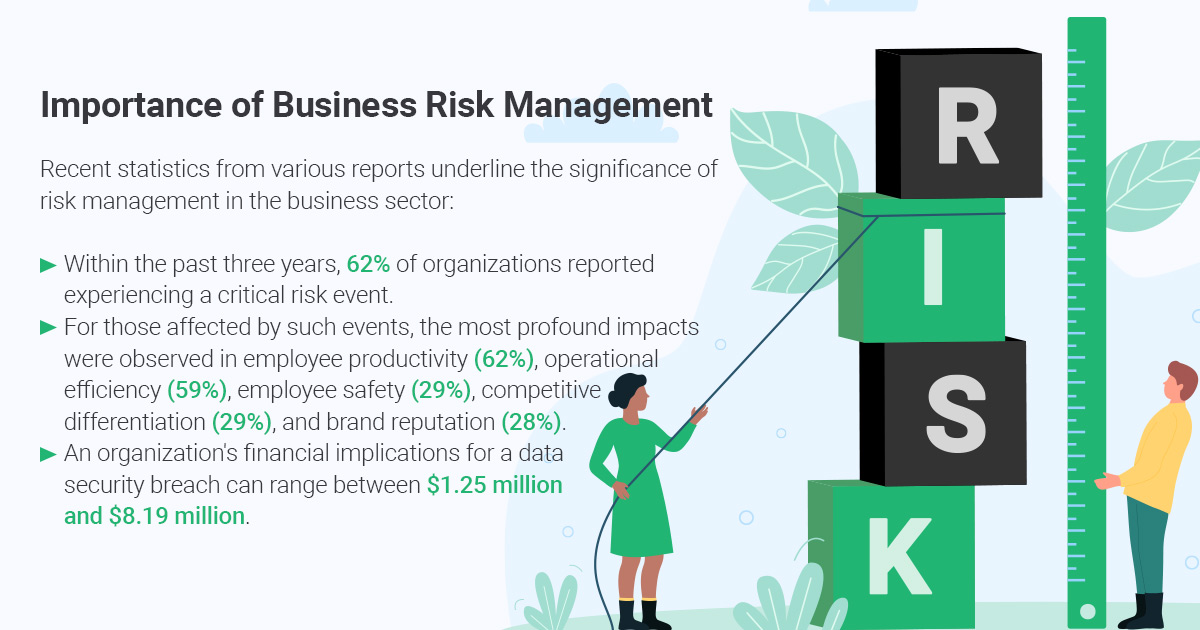Enhancing Company Efficiency Through the Importance of Risk Management
Enhancing Company Efficiency Through the Importance of Risk Management
Blog Article
The Crucial Significance of Risk Management in Getting Business Objectives
This is where Risk Management steps in, providing a structured strategy to recognizing, evaluating, and mitigating possible obstructions to advance. As we explore the crucial function of Risk Management in accomplishing organizational goals, one can't aid yet question: exactly how does this equate right into real-world success?
Recognizing the Concept of Risk Management in Service

The Indispensable Role of Risk Management in Strategic Planning
Incorporating Risk Management right into calculated preparation functions as a protect for companies, anchoring their long-lasting strategies with a solid structure of readiness and resilience. It operates as the organization's radar, identifying possible threats and vulnerabilities that could interfere with the course towards accomplishing their specified purposes. Risk Management provides a framework for anticipating unpredictabilities and creating ideal responses, making sure the company's survival and success also when faced with misfortune. By incorporating Risk Management right into critical preparation, organizations can transform these uncertainties right into opportunities for growth and technology. This strategic interweaving of Risk Management cultivates adaptability, making companies extra durable and allowing them to browse the ever-changing organization landscape with confidence. Risk Management comes to be an essential device in strategic preparation, instrumental in protecting sustainable success.

Methods for Identifying, Assessing, and Focusing On Threats
Browsing the facility landscape of threats needs the application of details methods for their recognition, prioritization, and assessment. The procedure begins with Risk identification, employing tools such as SWOT analysis, which assists in pinpointing possible risks and possibilities. Next, Risk evaluation is performed to establish the potential influence and likelihood of each Risk. Tools such click to read as Risk matrices and impact-probability graphes are used for this. Ultimately, risks are focused on based upon their possible effect and probability, enabling companies to focus their sources on critical threats. This methodical method ensures an extensive understanding of the Risk landscape, making it possible for companies to make informed decisions and effectively manage risks to achieve their objectives - importance of risk management.
Securing Organizational Workflow With Efficient Risk Management
In the service landscape filled with uncertainties, efficient Risk Management plays a pivotal role in safeguarding business here are the findings procedures. By identifying and examining possible risks, Risk Management enables companies to establish durable contingency plans. Companies must invest in comprehensive Risk Management approaches to secure their operations.

Converting Possible Threats to Opportunities: The Power of Risk Management
While prospective threats may initially show up as obstructions to organizational success, effective Risk Management can transform them right into possibilities. A positive approach to take the chance of Management entails determining, examining, and prioritizing threats to go develop techniques that turn them right into prospective benefits. This procedure necessitates the growth of a risk-aware society within the organization, motivating people to view dangers as possible drivers for change and development, as opposed to mere threats. importance of risk management. Via this lens, prospective hazards become chances to innovate, boost processes, and enhance resilience. Thus, by leveraging the power of Risk Management, companies can not only safeguard their procedures however additionally stimulate development and accomplish their goals in an unpredictable organization environment.
Case Researches: Success Stories of Risk Management Driving Business Objectives
Successful execution of Risk Management techniques has actually generated impressive results in numerous organizations, emphasizing the qualities of this strategy. International business like Microsoft and Google, for instance, have leveraged Risk Management to decrease hazards and exploit chances, driving their company purposes forward. These examples highlight just how successful Risk Management can not only steer services clear of potential pitfalls however additionally assist them towards their critical purposes.
Final thought
In final thought, Risk Management is essentially crucial in achieving organizational goals. By incorporating Risk Management into tactical planning, organizations can much better browse unpredictabilities, protect procedures, and capitalise on possibilities, thereby lining up with lasting objectives.
At its core, Risk Management is the process of recognizing, assessing, and dealing with prospective dangers that might negatively affect a company's procedures or purposes. Next, Risk analysis is carried out to establish the prospective influence and possibility of each Risk. Dangers are prioritized based on their prospective effect and possibility, allowing companies to focus their resources on critical risks. By identifying and assessing prospective threats, Risk Management enables companies to establish durable contingency strategies. A positive method to risk Management involves recognizing, evaluating, and prioritizing threats to develop strategies that transform them into possible benefits.
Report this page